#but with podcasts i will get extremely violent
Explore tagged Tumblr posts
Text
"gender bent au" what if I hit you with a metal chair.
"gender bent mag" what if I take your internet away and make you think. for once
I see people headcanoning Tim as trans femme. I'm in the crowd cheering for them screeming at the top of my lungs. someone yells GENDER BEND AU? i approach from behind, crouched down.
EDIT I'm not sorry for going insane in the tags. enjoy the rant because I think it's important. 🏳️⚧️
#this counts for ANY fandom#but with podcasts i will get extremely violent#if you don't agree I don't mind keep writing and reading your stuff and have fun#but realize that in a podcast as human as tma there's literally no gender that matters starting from the archivist.#pronouns don't equal gender but literally everything you hear starting from the characters voices and what is being said about each of them#DON'T EQUAL GENDER#you can hc them ans switch their so called genders#but understand that my deep dislike from genderbend aus come from gender as not a concept but a feeling and experiences#gender is so much more than labels.#and now to get into the specific media i saw this from. tma? please. the archivist is the first to be nonbinary simply because himself +#doesn't care and jonny has a much broader view on gender that i bet he never cared about making the characters fit. they exist in the +#archives and have voices and that means nothing. alice might be trans. a LOT of characters can be trans. are you going to gender bend them?#tma#the magnus archives#jonathan sims#tma podcast#jon sims#jonny sims
32 notes
·
View notes
Note
ive never heard of woe.begone what is it? :o
It's a podcast! Created by Dylan Griggs who writes, voices, makes music, sings for and directs the whole thing.
It's about Mike Walters who discovers an ARG on Reddit and on a whim he tries it out. Once he completes the first challenge he realizes that the game completely reversed the most traumatic night of his life and brought his friend back from the dead.
Except now he has to do painful and terrible challenges that the sadistic gamerunners send him, to keep said friend alive.
It's even better because Mikey is not your typical protagonist. He's not the noble hero who struggles with doing immoral things because he has a code of honor or anything like that he's a whiny, self centered cowardly guy who may be scared of doing certain things but he does them because he's more concerned about keeping himself (and his friend) alive than he is about commiting crimes.
The second he gets any power he becomes insufferable and one of the best parts of this podcast is watching him fall from grace because he got too hot headed about his victories. (I love Mikey so so much)
WOE.BEGONE goes in directions you cannot ever predict, that's why you start out with a guy playing an online violent ARG and you end up having time traveling gay cowboys fucking up the timeline to save their loved ones, Giant Horse Tiktok stars, grass that eats people and mad scientists who cannot for the life of them stop falling in love with their test subjects.
All of the music is written for the podcast, there are vocal albums, in Season 9 there was even a mini ARG for the fans to decode, and a very lovely community who is extremely passionate about this show.
Highly recommend checking it out!
#anonymous#asks#woe.begone#podcast recommendations#rusty quill#its also extrremely gay#a rule of thumb with woe.begone is: if you think someone's straight - no they're not
66 notes
·
View notes
Text
Some controversial thoughts about the Peachyville Horror
I've been seeing how everyone is reacting to Francis's moment in the bathroom in this latest episode (episode 7) and I thought I might as well add one more.
Francis is someone who is mentally unstable, yes. I think this is something we can all agree with. He's surrounded by people who seem to either enable his actions in one way or another or they're on a list of people he keeps which we can only assume is something like a hit list. He's been looked down on by his parents, bullied by his peers, and generally just beat down by everyone around him including himself at this point. Then he won that trophy. That's where everything shifts. He's the one to take it home and it's obvious that by how Will was describing that trophy, something about it had negative energy.
⚠️Now I get into some gory details in this next part so fair warning ⚠️
Now, Francis had his dream and suddenly became violent to an extent that he would joke about it and people would feel threatened. Relistening to episode 5, he threatened a man after scooping his eyes out with an ice cream scoop by kicking him in the balls and then grabbing his eyeballs and threatening to squeeze them. Now, I get it this is a horror comedy podcast but if we are gonna analyze a character I'm taking everything into account and really this is the first and really an extremely violent thing for a person to do, especially when this is the first actions he's been known to take.
Getting the gun and instantly he seemed to know exactly what he "needed" to do. On a dime, the Francis we knew just a few episodes ago was already so different.
Now that brings us to the bathroom scene. People have been saying it was a mental "snap" or "break" which doesn't line up, like how most others have pointed out that this was something that was premeditated. He planned out this whole thing and followed through with it. And to those who think he did this so Shane wouldn't bother him anymore, he didn't see Francis at all through the whole attack, which yes, Francis could go back and claim he did it but I still this it's important to note we don't know if Shane will believe him.
That being said, with every increasingly violent act that Francis had done up to that point it made sense within the confines of his world. It was in his character that things have played out this way so far. And really I think it's going to make for a really interesting character arc. He isn't going to to be a character that we have seen before, which when we just had a season of teens that were just coming into themselves Anthony is getting his chance to get his character in, and it is a horror series. This doesn't make any of the actions acceptable by any means and this should not encourage people to romanticize any of the actions he does. There is a way to like a character and not romanticize their actions, some of these posts remind me of posts of people romanticizing real murderers and shooters, which is rather disturbing.
TLDR
Francis suddenly got violent after bringing the trophy home, having a dream after being under his teacher's bed for 4 hours, and now he's suddenly he's on a bloody rampage and those around him are either enablers or in his line of fire and that's an interesting new character to think about. But don't romanticize that shit.
Extra
• Another idea I saw floating around was that Francis got switched with his reflection in the trophy, which I love the idea of this one. It can keep the idea of mental health slightly but it brings the story back into it. But, I understand that even without evil trophies, people like Francis exist in our world.
• Also having him practice with his bully's face as the target was really the warning. I personally didn't know the scene was going to be that graphic but now looking back I get the horror side of the podcast now. As someone who lives in America it was something that shocked me the first time listening to it, knowing that the usual stuff that the guys bring up I can laugh off. This scene most definitely felt different and I'm sure that it's going to be a huge turning point for a lot of things.
#peachyville spoilers#the peachyville horror#peachyville horror#peachyville#dndads the peachyville horror#dndads#dungeons and daddies#dndaddies#dndads s3#francis farnsworth#I just wanted to talk about him I think tbh#I have thoughts on the other three too but this post was already too long#Francis is gonna be really interesting but I can already tell I'm gonna be so traumatized by him 😭#give the kid a hug#take his gun away too 😭#and maybe some therapy#anyways#thanks for reading#ok have a good day
61 notes
·
View notes
Text
im bored on the bus so have a tangent about melanie king because i love her (spoilers ahead)
melanie’s character is so beautifully complex and tma really pulled it off so so well, especially her relationship with jon.
they didn’t ever like each other, not once in the whole podcast. BUT they were forced into a situation where they had to cooperate. neither of them liked it, but the bond they formed through their traumas was definitely a strong one. i really enjoy the fact that at the end he goes to melanie for help, and she essentially says she’d help with literally anything else except what he was asking. she knows herself and her limits by the end, but would also be willing to forgive and even be friends with jon if there was no element of supernatural danger involved.
also, a lot of her anger throughout the story is completely justified, even if her ways of expressing it are extreme- but then again, the situations she found herself in were extreme, so no one can really blame her for acting that way. melanie didn’t quite know what she was dealing with but she knew it was bad and that it needed to stop, so she tried her very best to do just that. there’s a difference between bravery and sheer hatred for a situation you’ve been forced into, but melanie displays a perfect mix of these things in different ways. especially post-impromptu-surgery by jon, her bravery is in her vulnerability. she apologizes for stabbing him, she wants to go to therapy, and she wants to help herself not be so angry- even if that anger had helped her get where she wanted to be in the past.
and her anger is through much more obvious points, ones impacted by the Slaughter- trying to poison elias, killing all of the bone thingies, stabbing jon, yelling at people to make her points. she still was taking action in attempt to better her situation.
we get to see these things mixed a bit with her cult. she definitely is not opposed to taking violent action, but we also get to see her vulnerable side more. whether it’s georgie, the admiral, or strangers she’s given shelter, she knows there’s something she can do to help, and she does it because she cares. not just because she’s angry. even when jon and martin came and she knew they could be a risk to everyone there, she tolerated their presence because she didn’t want them to die.
aaand idk i love her idk if this makes any sense, lemme know if you’d like me to continue it tho :)
if anything in here strays from cannon it’s cause it’s been a few months since i finished tma and i don’t remember everything so pls be kind 😭
#melanie king#melanie king appreciation post#the magnus archives#tma#jon sims#martin blackwood#the admiral#georgie banks#magnus archives
44 notes
·
View notes
Text
nyen -> nirvana (obviously), tool puscifer a perfect circle like any kind of MJK project, kmfdm, dead kennedys ? maybe, pearl jam, aerosmith. middle age white american dad rock. you know. maybe nine inch nails too. giving him all my favorite bands. peter steele awoken something in him. also likes more extreme bands probably
robert -> morphine, the doors, failure, the smiths, coil if the mood is right, miserable faith.. morphine is like the number one band i associate w him always though
nyon -> tbh i dont hc as a music listener like he doesnt actively seek out music to listen to. listens to whatever nyen listens to or podcasts in his native language. probably listens to a barely known russian band whenever he gets high (i also associate violent femmes songs w him lel)
randal -> canon throbbing gristle fan which is so cool. also probably listens to nightcore. maybe some other weird music genres to shock people for fun (mostly sebastian) like current 93 or whitehouse . alternatively listens to stuff like this . he also listens to tears for fears canonically i forgot about that. guy with the most random music taste
sebastian -> No Fucking Clue. he probably listens to rap rock maybe some hip hop he doesnt think about it too much. oh my god he would listen to ween and smashing pumpkins and blink182 probably. like loser nerd shit (affectionate)
luther -> puts hands on my head. help me. doesnt know much about what The Kids listen to these days. hes old. likes old music. IDK!!!!!! its 3 am. maybe he'd dig cocteau twins bc its Calming and Nice
#mmmmmmmm#rambling............ and projecting all my music tastes onto them. bc i can#dont know who would listen to nurse with wound but by god will i attach it to Someone someday#(number one nurse with wound fan)
39 notes
·
View notes
Text
I Have Complicated Thoughts About Mother 3

Note: Patreon donors can listen to this article as a podcast narrated by me. Click to learn more.
Confined to a tiny room, I pulled out my off-brand retro portable and loaded up the fan translation of Mother 3. It had been on my list of "important games to play" for literal years at this point, if not more than a decade, and playing Mother 3 was bottle necking a lot of other stuff -- for example, I also wanted to play Undertale, but swore I'd need to finish Mother 3 first, despite being very graciously gifted Undertale only a few months after it came out on PC.
Being something I wanted to play, that obviously meant avoiding spoilers. When the ability was added to places like Twitter or Tumblr to block specific keywords, often the first one I'd block was "Mother 3" alongside the names of a handful of characters I knew like Lucas, Claus, and Kumatora.
I'd played a couple hours of Mother 3 once before, right when the translation patch first came out, so I knew what happened in the opening scenes of the game. I knew what a gut punch it was. It definitely worried me, because as I started the game back up, now in 2021, I silently thought about what it would be like playing a game that starts with your player character's mother dying, as I looked up at my own bed ridden mother.
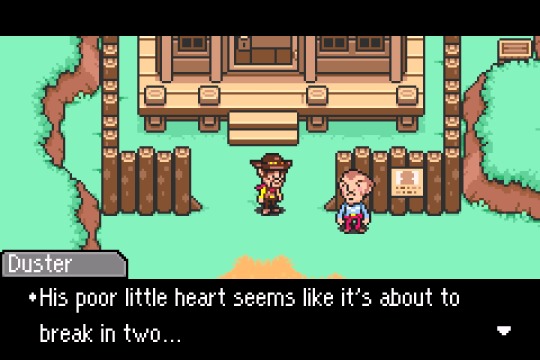
It was May of 2021 that she developed debilitating back pain. There was an easy enough explanation for that; we had just gone through a hellish (and potentially legally dubious) renovation forced upon us by the corporation that owned our gigantic apartment complex. Due to a scheduling error, we had less than a week to pack up our whole apartment so they could move us out, renovate the unit, and then move us back in. We attributed her back pain to that moving process -- lifting cardboard boxes and such.
But the back pain kept getting worse. They prescribed her stronger and stronger medication for what they claimed was sciatica, but it never seemed to help. After multiple trips to the emergency room, she was finally admitted to the hospital proper, where her femur randomly shattered during a routine procedure. The femur is the longest, strongest bone in your body, and typically only breaks during extremely violent impacts, like car crashes and stuff. For my mother, it broke as nurses were shifting her around to clean her bedding. Tests for bone cancer seemed to come back negative, so the doctors shrugged at us and considered it a freak accident and just the toll of old age.
There was no way she was making it back up the stairs to our apartment any time soon (if ever), so it was decided she'd have to heal from that broken leg at my brother's place, and since my brother and his wife both work day jobs, I volunteered to take care of my Mom while she got better. Hence why I was stuck in this tiny room, booting up Mother 3 in July or August of 2021.
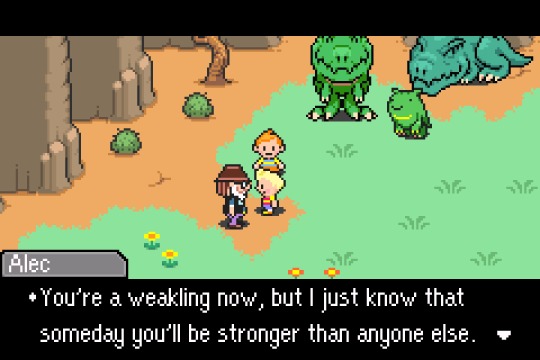
My Mom never got better. It would be eight months before they told us they had somehow missed detecting her cancer, and by then, it had spread so viciously they weren't even sure where it originally started from. By the time they told us this, she had only days left.
Every step of the way in those 8 months, as she insisted over and over she was healing and told me about all the things she wanted to get back to doing, I believed her. But my Mom also taught me to always expect and brace for the worst. So as I watched Mother 3's Claus and Lucas bury their own deceased mom, there was an undeniable heaviness swelling in my heart. A feeling I could not shake. Though I didn't know yet, I knew something wasn't right, even if the doctors continued to shrug as more symptoms mounted. I could see myself in the same shoes as Claus and Lucas, and I didn't like it.
Once upon a time, I loved RPGs. I cut my teeth on Final Fantasy 2 for the SNES. Though to be honest, I don't remember my time with it very fondly. I didn't really understand the genre; I thought "hit points" referred to points on the body you could be struck at. Like, your elbow is a hit point. Your ear is a hit point. So on and so forth. When the game told me a monster like Scarmiliogne had "3,000 Hit Points", I figured that meant he was a giant, and thus had more surface area to strike at. I was not a very bright kid, but in my defense, nobody ever bothered to correct me, either.

The first RPG to really stick out in my head was Earthbound (known in Japan as Mother 2). On the surface, Earthbound felt like a kitschy look at hometown Americana, as filtered through the lens of a Japanese writer. Though Earthbound sort of focused on contemporary America when it came out, to me, it's always carried this vibe of Norman Rockwell by way of The Peanuts gang. Though you chat it up with mohawk wearing punks, visit video arcades, and order pizza over the phone, something about its story feels deliberately retro and nostalgic, even in the mid-90's when it first came out.
Earthbound is about leaving home for the first time, feeling sad about it, and calling your Mom at a payphone to cheer up. It's about taking on huge responsibilities while you're still just a kid swinging a baseball bat. It's about going from your house on a dirt road and traveling all the way up to the big city and beyond. It's about making best friends and bullies, and some of those story elements hit close to home for me. It's about finding an inner strength you didn't know was there, and to keep going, no matter what. It's about music and the secret song that plays in your soul.
Earthbound is a warm, deeply heart-felt game that also happens to feature zombies, bubblegum chewing monkeys, time travel, secret civilizations full of unknown creatures, and a sequence where you beat up an entire police force one cop at a time.
That is not the kind of game Mother 3 is.
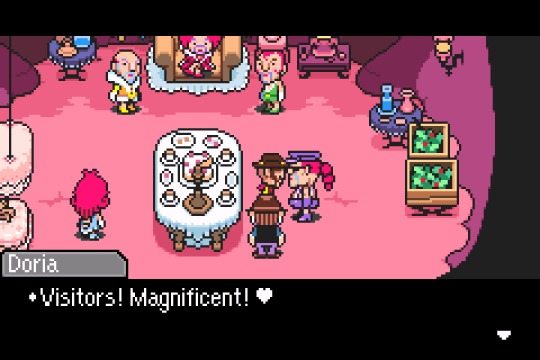
I suppose I wasn't really sure what I expected Mother 3 was going to be. All I'd really known was Earthbound, plus the 5 or so hours I'd played of the original NES game, retroactively renamed from "Mother" to "Earthbound Beginnings" in 2015. The retro Americana vibes I felt in Earthbound are even stronger in Beginnings. Though the story of Earthbound Beginnings claims it takes place in the 1980's, the visual identity rings much closer to the 50's or 60's. One of round vintage Cadillacs, greasers with big pompadours, and roaming hippies preaching peace and love.
Mother 3 deliberately obscures when and where it's set, for reasons that will eventually become clear. You better get used to it too, because holding information back is kind of a running theme.
Because if I'm being totally honest, I didn't like Mother 3. And at first, I was struggling to figure out why. Earlier when I said "I loved RPGs", that's because my life changed to a point where I felt like I didn't have room for them anymore. Games with lots of dialog meant they demanded my full, undivided attention. When I was sitting at a TV or a computer, I was often multitasking between multiple forms of output -- I'd be doing work while watching a Youtube video or listening to a podcast, and that slowly began to push out story-driven games like RPGs in favor of lighter, more replayable experiences I could engage with while I also did something else.
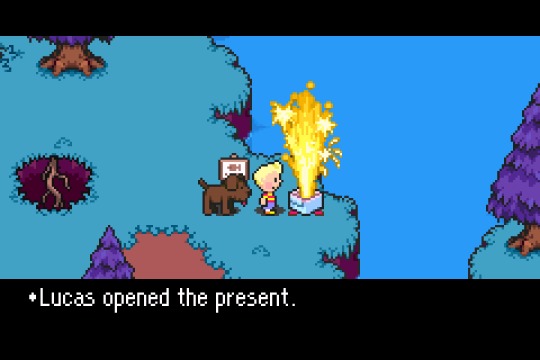
The one place that was not true was in the portable space. I didn't have a smartphone for the longest time, so I'd often find myself in a commute or on a lunch break at work with nothing to do but pull out something like my Nintendo DS and crank away at an RPG. I devoured games like Final Fantasy IV, Phantasy Star Zero and Bowser's Inside Story. Even games I did not particularly like, such as Kingdom Hearts re:Coded and Pokemon Pearl ended up getting a lot of play.
At some point that changed, and it changed so gradually I didn't even realize it for the longest time. Over the last ten years I have tried and failed to enjoy portable versions of Final Fantasy V and Final Fantasy VI, and found neither game to my taste. FF5 felt far too boilerplate in terms of structure and I simply got bored of it halfway in. With FF6, hype had led me to believe it was some kind of life-changing RPG super-classic, and I came away extremely unimpressed with both its story and its pacing.
Both FF5 and FF6 came at a time after I'd finally gotten a few Android devices of my own -- in fact, most of Final Fantasy V was played on a Samsung tablet while I was at work. By now, I was starting to question whether or not having breezy mobile games like Pac-Man 256 was hurting my ability to commit to longer RPGs, even in the last space where it felt like I could sit down and focus on them.
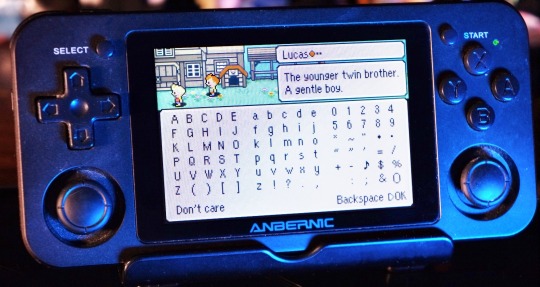
This is sort of what spurred me to start Mother 3 at all: since I was at my brother's place, my desktop computer and most of my video games were on the other side of town. All I had with me was a 12 year old laptop that was only good as a word processor, and a handheld emulation device called an "Anbernic". As the weeks stretched into months, I needed something to do or I was going to go insane. It seemed like no better time to knock something off my bucket list, but now it was starting to feel like strike three with portable RPGs.
My malaise only added fuel to the fire: am I now simply too distractible everywhere? Would I rather be playing simple, quick-hit arcade style games, forever?
It seemed like the perfect scapegoat, too. Maybe the problem wasn't that Final Fantasy VI hasn't aged very well, and more just the fact that my tastes had changed. After all, Final Fantasy VI is deeply beloved and considered one of the best games in the series. Perhaps I was the problem.
But that's not entirely true. The problem with FF6 is that its story simultaneously felt too complex and dead simple at the same time. By now, I was engaging with RPGs where I'd only play them for 20-30 minutes once a week, and I could never remember what was going on because the plot felt like it was over my head. But when a major event would happen, it was always conveyed in this rushed, shallow way. The reason I could never remember what was going on is because nothing ever felt important enough to leave a lasting impact on me.
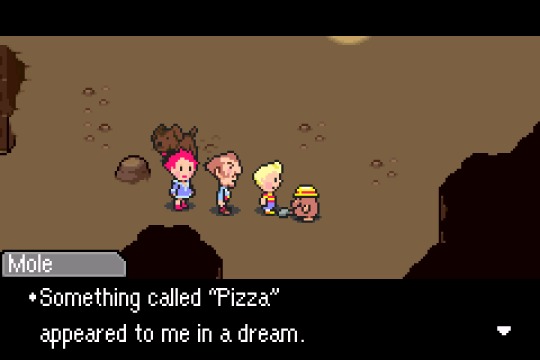
That was never true with Mother 3. Even though it took me close to three full years to finish it, it wasn't that hard to recall where I'd left off, even if "where I'd left off" was over four months ago.
No, the further I got into Mother 3, the clearer it became that I was not vibing with the story.
Whereas the first two Earthbound games seemed to be deeply mired in warm feelings of childhood nostalgia, Mother 3 is a bitter, angry game about how much growing up sucks. All three games are of children coming of age and taking their first shaky steps into adulthood, but whereas Earthbound wields rose-tinted sweetness, Mother 3 grabs you by the neck and lays out a cold, harsh reality.
You play as Lucas, who has a twin brother named Claus, and a father, a cowboy named Flint. The death of their mother shatters their entire family; both Flint and Claus have emotional breakdowns, the latter of which ends in Claus running away from home and Flint leaving to go find him. Both of them vanish. That leaves you, as Lucas, in the care of your grandfather, Alec.
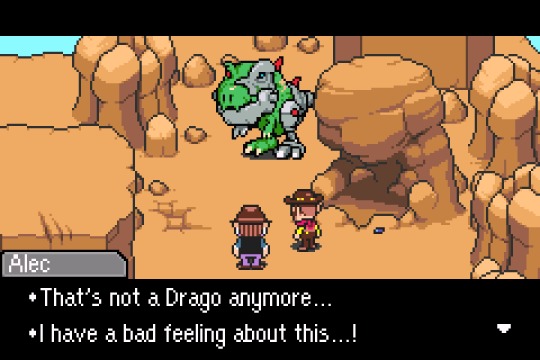
Unfortunately for Lucas, the accident that killed his mother was only the start of a dangerous chain of events, and he soon finds himself swept up in adventure in the way RPG protagonists generally do. Earthbound set itself apart from typical RPG tropes by getting away from fantastical elements and basing itself in real life (albeit a strange, exaggerated version of it). Places with bicycles, fast food, and ATMs.
Mother 3 generally avoids this. You're introduced to Tazmily Village, an isolated farming community of log cabins and dirt roads, buried deep within the heart of the Sunshine Forest.
It's not really known when or where Mother 3 is set. Compared to Earthbound's attachment to contemporary America, Sunshine Forest and the areas surrounding it feature strange creatures like dragons, and even old, dilapidated castles. And yet Mother 3 also seems to have more in common with the wild-west-era American frontier than it does anything else, but even that isn't quite right.
Tazmily is presented as the ultimate in idyllic life. It's a place where everybody helps everybody, intrinsically, out of the goodness of their own hearts. Poke around at the start of the game and you'll find that though they do have a jail, it's never been used, because nobody has ever committed a crime.
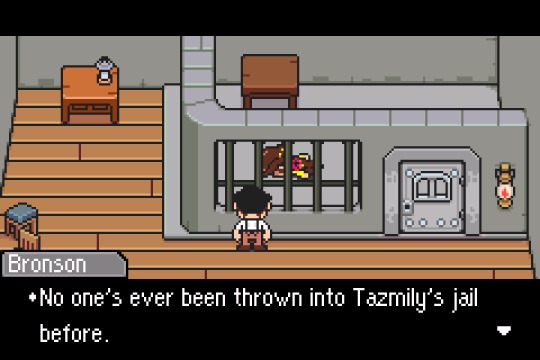
Until one day, a mysterious man named Fassad appears. He's quick to charm the residents of Tazmily, and introduces the village to the concept of money. He also introduces the concept of deception, as in the night, Fassad steals some of that same money, sowing the first seeds of greed and distrust in these simple people. This rapidly transforms Tazmily from a sleepy, easy-going community to a bustling town of paved roads, automobiles, and even, thanks to further gifts from Fassad, technological entertainment delivered by his "Happy Boxes" -- cubes with embedded, glowing screens that emit a hypnotic signal intended to make people feel good (and more willing to spend their newly acquired finances).
As Lucas, you oppose all of this. Fassad is clearly an evil, scheming man, both establishing and sabotaging a structure of financial power for his own gain, and its changing Tazmily for the worse. Since Fassad has arrived, Tazmily has seen an increase in monster attacks, and eventually even freak lightning storms that destroy whole entire buildings -- which coincidentally always belong to people that oppose Fassad.
Funny how that works.
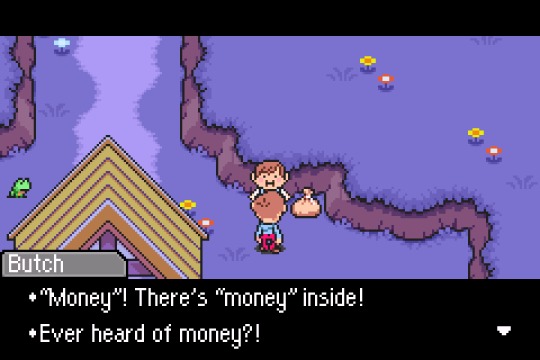
After Lucas and his grandpa Alec accuse Fassad, he uses his foothold with the people of Tazmily to brand you as a traitor. The very people that once treated you like family now curse your name for daring to threaten their modernized way of life. Soon, the first mayor of Tazmily officially disowns you, your grandfather is locked up in the newly built elderly care center, and your house somehow ends up being the next thing obliterated by the mysterious lightning storm.
It's a hell of a first impression. The dominating message Mother 3 sends in its opening chapters is that things used to be better. Back when it was just people helping people, before the days of television, and cars, and roads, and even money. When the only thing that mattered was the sweat on your brow, the food in your stomach, and where the sun was in the sky.
It felt cynical to me. Jaded. Things were different in 2006 when Mother 3 first came out, but it's hard not to read that today as some extension of the tired complaints around having too many devices and too much convenience. Like that meme that simply blames all of society's problems on having a phone. And it's a well Mother 3 goes back to over and over and over again: that Fassad brings the corruption of money, the corruption of technology, and the corruption of modern civilization, turning the residents of Tazmily into rude, vapid, ignorant zombies who have grown complacent with the increasingly bad things happening around them.
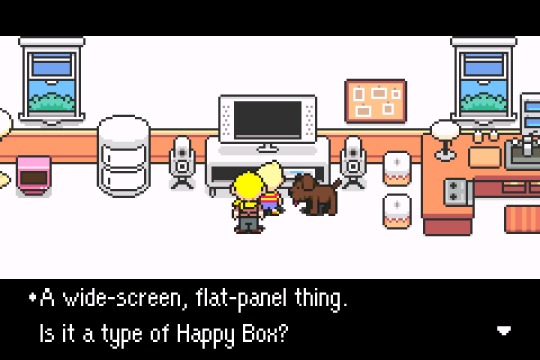
And that's not the only thing in the game that can be read as cynical, either. More than once Mother 3 presents us with scenarios where Lucas faces down adult responsibilities and uses this as a way to express something depressing or frustrating as just being the way the world works. Such as early on when Lucas has to enter a factory as a new employee, and we're told about the joys of child labor -- including the hard hours you're expected to work for minimal pay.
Or how about when you receive a fast travel vehicle halfway through the game. Not only will it become permanently unusable if you accidentally allow it to run out of fuel (pretty easy, considering there's no visible fuel gauge), but refueling it incorrectly will cause it to explode, also rendering the vehicle useless. After all, you're just a dumb kid, and complex machines like these are meant to be cared for properly.
Some of this is definitely meant to be more funny than serious or soul crushing, but the whole game has this rough edge to it that wasn't there in the original Earthbound, where Lucas brushes up against some fact of adulthood and it serves as an uncomfortable lesson. I couldn't help but read it as the game imparting something about how much growing up sucks, and how much that's just a part of life. Your parents will die, your neighbors are ignorant, work sucks and you'll probably mess it up anyway. Get over it.
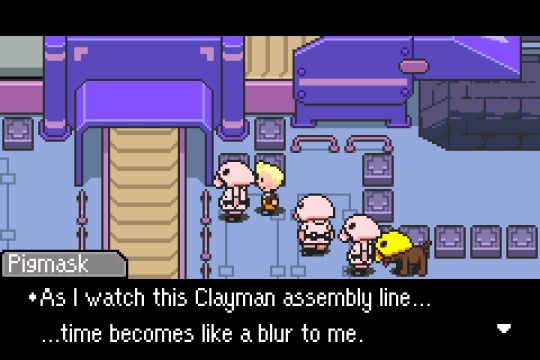
I even got this impression coming from the game's own upgrade systems. Both Lucas and another party member Kumatora can learn PSI abilities, which are basically the game's magic spells. When Lucas or Kumatora gets strong enough to learn a new PSI ability, they break out in an uncontrollable fever, a status effect that limits your ability to do certain things like sprinting. Until that fever breaks, you have to slowly walk everywhere.
It doesn't really add anything to the experience. It doesn't make the game more fun, or more exciting. It's just one of those annoying things you have to put up with, because again, that's life, kid. Sometimes you get sick and you just can't move very fast.
The overall vibe of cynicism gets even worse as you start encountering Mother 3's handful of references to Earthbound. Mother 3 may go out of its way to forge a narrative separate from Earthbound, but there are definitely more than a few scenes referencing special moments from that game, and at least to me, all of them felt extremely pandering. It was as if Mother 3 was beating me over the head, jumping up and down shouting, "It's that thing you remember! Do you remember? Remember Earthbound? Look, we can do that thing too!"
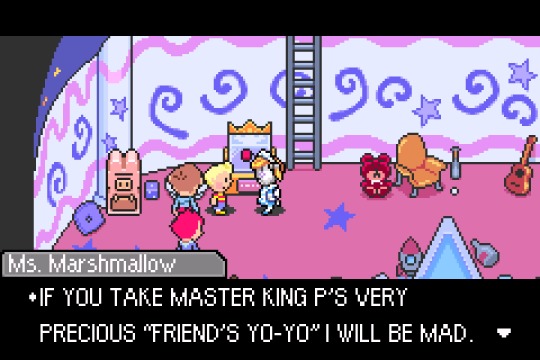
The further you progress in the game, the more these references change from feeling pandering to almost being mocking. It's eventually revealed that the game's true antagonist, and the man giving orders to Fassad, is Porky, the mean little rich kid from Earthbound. Porky has now become a man who seemingly lives in the past, having constructed multiple shrines of mementos from his adventures battling Ness and friends in the previous game. The ultimate version of this is his monument to nostalgia, New Pork City, the final area of Mother 3.
It's effectively one gigantic theme park patterned after the major locales of Earthbound, all focused around celebrating how great Porky was back then, and how great he apparently still is.
And again, it felt unnecessarily angry. Just like how Fassad conquered and spoiled the idyllic village of Tazmily, Porky had taken ownership over Earthbound nostalgia and made it feel dirty. It felt like Mother 3, a game that went out of its way to be so different from Earthbound, sometimes almost shockingly so, was now spitting directly in my face. Porky, the ultimate obnoxious loser who just won't go away, refuses to let go of Earthbound. And you don't want to be like Porky, do you?
It started to feel insulting. Several times over the course of playing Mother 3, I was considering quitting the game and never looking back because it seemed to be going out of its way to twist the knife. Was Mother 3 somehow bitter about Earthbound's legacy?
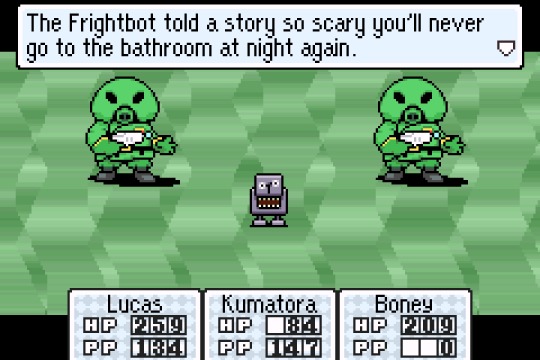
Again, I had done my absolute best to avoid spoilers. Blocking Mother-related tags on social media was just the first step. In general, when Mother 3 came up in casual conversations I was privy to, I would quietly excuse myself and find somewhere else to be until I was sure they had changed subjects.
There has been a degree of "spoiler culture" discourse in recent years. Some claim it's a marketing tactic. Marvel movies only make you care so much about spoilers because that's how they get butts in seats on opening weekend. I don't know about that -- I've cared about spoilers my entire life, and I know I'm not alone. The pilot episode of the seminal sitcom Seinfeld ends with Jerry trying to avoid spoilers for a Mets baseball game that he recorded. And that was 1989. It's been a valid concern for much longer than any notion of a summer blockbuster movie.
Simply put, surprises are better when they are surprising. That doesn't mean you necessarily have to like surprises, but I think you'd have to be a pretty sad sack to go out of your way to ruin a surprise for someone else. For people who aren't curmudgeons about it, there are few things better in life than a nice surprise. Something unexpected like that could make a person's whole day, if not their whole week.
If modern movie culture has done anything, it's made people unable to keep spoilers to themselves. Blocking social media terms will only get you so far. When an artist posts a piece of fan art or friends share memes and they don't include any text, then there's nothing for the blocking algorithm to detect. And when a conversation starts with spoilers, there's simply no time to avoid the landmine -- which, to be fair, was the final punchline Jerry suffered in the Seinfeld pilot, as his neighbor Kramer blurted out the results of the game before Jerry had a chance to protest.
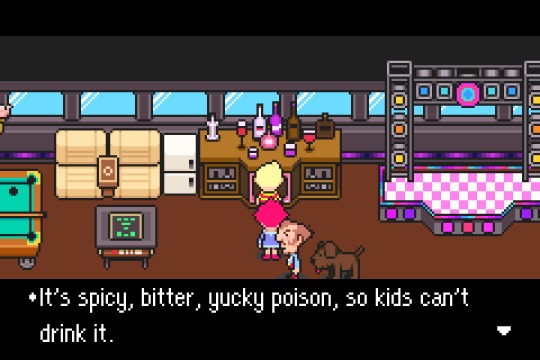
Many of Mother 3's biggest mysteries were spoiled well in advance of me ever actually playing the game. The biggest one being the reveal of the mastermind behind the game's Pigmask Army, the aforementioned Porky Minch. Mother 3 goes to great lengths to tease this mystery out across its entire 30 hour run time, dropping major hints as you pass the halfway point.
And then Porky, in his Mother 3 form, cameos as an early boss battle in Super Smash Bros. Brawl, one of the ten best selling games on the Nintendo Wii. Thanks to director Masahiro Sakurai, more people know who the final boss of Mother 3 is than have actually played Mother 3 (or, let's be honest, will ever play Mother 3).
This is why I freely mentioned Porky earlier, because if anyone knows anything about Mother 3 at this point, it's that Porky is the primary villain. The same goes for New Pork City, which was a prominent arena in Smash Bros.
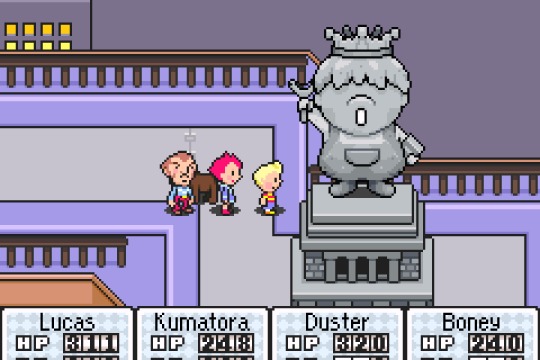
In a roundabout way, Smash Bros. was also responsible for the other major Mother 3 spoiler I bore witness to; Mother 3 pixel artwork ended up being used in other Smash Bros. games over the years, including artwork of other characters with secret identities. That hasn't stopped a number of Smash Bros. fans from casually name-dropping the true, unmasked identity of this character online. I may have avoided conversations about Mother 3, but the tendrils of these spoilers extended far beyond its humble borders. Sometimes, you just can't escape it.
This is not me drumming up any sort of "woe is me" sympathy, mind you. But ultimately, it did have an effect on me. In most of Mother 3's cutscenes, I was waiting for the big reveals I knew were coming. Expectation is everything, and when you're watching every cutscene through a microscope, it changes how you see things. There's the old adage about being so focused on one tree that you miss seeing the rest of the forest, but imagine you're so zoomed in you can't even see the one tree, and you're just kind of... stuck there.
I often wondered if my general frustration with Mother 3's aggressive tone was related to the fact I knew some of its biggest late game emotional beats 30 hours in advance.
Would its numerous Earthbound references still feel so patronizing if I didn't know what was coming? Or would all of its cute little surprises and shocking revelations make for a more enjoyable game over the long term?
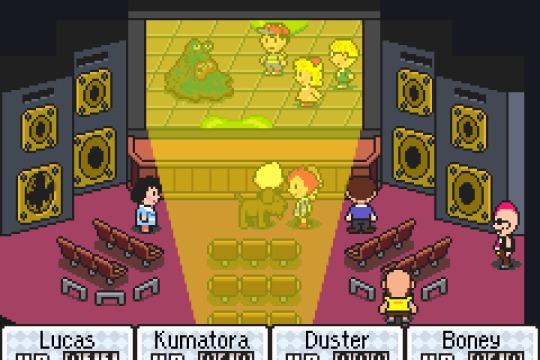
Maybe the whole thing started off on the wrong foot in general. It's definitely a choice to play a game about characters processing the death of their mother while you yourself are processing the death of your mother. Characters in the game itself get bitter about this, so doesn't it make sense that I would be, too? Again, expectation is everything, and sometimes you just wake up on the wrong side of the bed. It could have just been a bad time in my life to experience this story.
And to some degree that's true, because the thing about Mother 3 is that I just didn't get it for the longest time.
Despite a big rant about spoiler culture just now, I can't talk about this without spoiling Mother 3's last big secret, because it turns out to be central to the game's entire theme. However, in my defense, I am giving you a big warning: If you've somehow read this far and still care about preserving the game's final mystery (and parts of the ending to Earthbound, too), this is your signal to turn back now.
Okay. Ready?
So while the people of Tazmily are comfortable and protective of their newly developed suburban lifestyle, past the game's halfway point they all start talking about a far off land: the big city. It's a place where dreams are made, or so they're told. And as Mother 3 starts down its home stretch, Lucas and friends return to find Tazmily deserted. Everyone who's anyone has left for New Pork City.
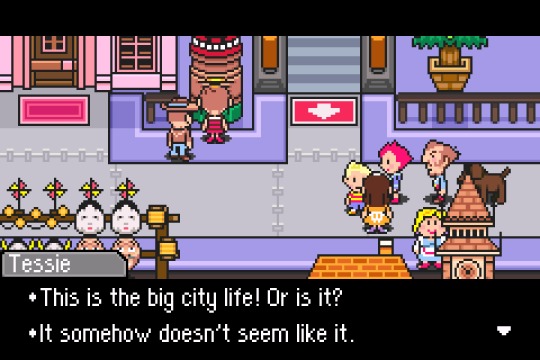
The reality of New Pork City is a lot more depressing than the dream, but then it always would be. The residents of Tazmily find it more trashy than cool. A lot of the theme park rides are broken, and those that still function are kind of dangerous. There's even open sewer vents leaking noxious gasses. And at the center of it all stands the massive Empire Porky Building.
Lucas and his friends are only allowed into the building when the time is right. Until then, you have to wander around New Pork City and explore.
Those open vents turn out to be an invitation to enter the sewer when Lucas's dog, Boney, becomes lost. Reuniting with Boney leads you to discover a secret entrance to the less glamorous parts of New Pork City, and you find yourself in an old, run down apartment complex. Though the hall is strewn with trash and grime, at the very end you find an apartment belonging to a strange man named Leder.
You initially meet Leder very early in the game. He's an older resident of Tazmily known for being unnaturally tall -- well over four times taller than most characters in the game. And to most people living in Tazmily, Leder is known to never speak. His only job is acting as a human watch tower, armed with a bell to be rung when there is danger.
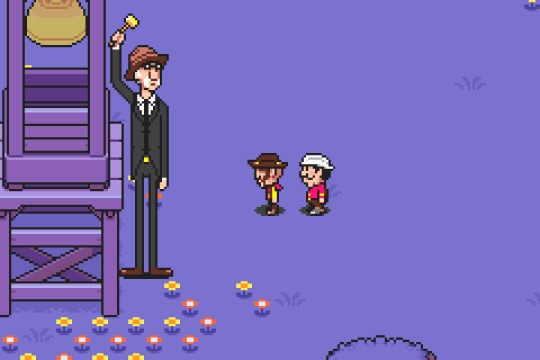
Leder's apartment in New Pork City is reasonably sized for a single person, with two floors, but for a man of his stature, Leder makes the space look tiny. However, by climbing up to the second floor, Lucas can now finally talk to Leder face to face for the first time. As it turns out, Leder can talk, but by being so tall, most people couldn't hear him. Not that it mattered much, given Leder had taken a vow of silence in order to protect the true origin of Tazmily Village. Given the circumstances, and considering Lucas is old enough now, Leder believes it is finally time to learn the truth.
The truth being that despite Mother 3's outward appearance of taking place in a fantasy land full of dragons and chimera, it is in fact a distant future earth. Or, well... what's left of it.
According to Leder's retelling, after bracing itself for the apocalypse, humanity finally found itself at the end of the world as we know it. Facing mutually assured extinction, a select group of individuals boarded something known as "The White Ship" and traveled to the furthest, most secretive location on earth in order to escape destruction. Once they arrived at this mysterious island, those people used a device to erase the memories of their past lives.
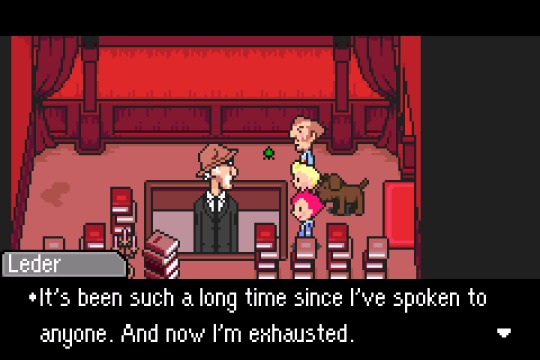
The idea was to start over from scratch, free from the bonds that lead to the destruction of the old world. And so, the simple farming village of Tazmily was born. It is very likely that Lucas is one of the first generation of people born and raised in Tazmily.
For years, Leder not only kept watch over Tazmily Village, but over its people, as well. Entrusted as one of the only people who knew the truth.
Tazmily Village was a success. Its people lived in peace and prosperity, free from greed and power. However, one day, a man named Porky appeared. Porky was not from this world -- not from the old world, and not a part of this new one, either. Using the Phase Distortion machine from the end of Earthbound, Porky had been carving a swath of chaos through all of time and space. Having been defeated and ejected from pretty much every other reality, Porky eventually found himself here: the last, most defenseless place on the timeline.
With nobody around to tell him no, Porky set about treating the island like his own personal playground. He used the Phase Distortion Machine to pull in creatures from alternate dimensions, he used forbidden science to establish an army and build factories. And, once Porky became aware of Tazmily and the truth of "The White Ship", he made it one of his goals to restore their memories and further exploit their desires.
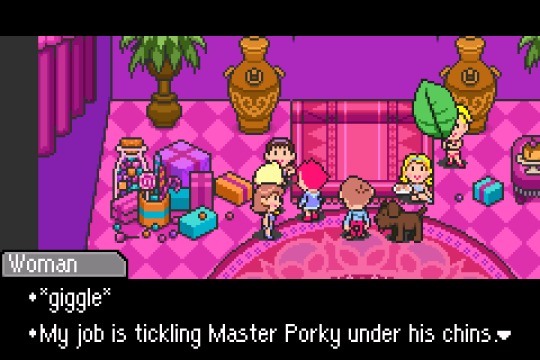
Leder's story recontextualizes all of Mother 3. It's not a game about people being corrupted by modern society; instead, it's a game about people being unable to escape it. That, despite their best efforts to run away from it, forget about it, and start over, who they are still catches up to them. When the residents of Tazmily brand Lucas as a traitor, they aren't doing it drunk on their shiny new toys, it's more that their old habits are re-asserting themselves. Not a people being corrupted, but a people who simply had their existing nature freed. Human beings acting like human beings.
This recontextualizes Porky's role in the story, too. More than being the harbinger of nostalgia, Porky takes advantage of Tazmily's amnesia to rewrite history to his benefit. His shrines to Earthbound memorabilia are less about making us remember what happened in the previous game and more about establishing his version of events, where he can refer to Ness, Paula, Jeff and Poo as his "precious friends" instead of what they actually were: the band of kids that stopped him from bringing about the eradication of the known universe.
Instead of shunning the past, Mother 3 is telling us that not only is running away from our history impossible, but in trying to do so, we open ourselves up to an even worse and easily exploitable weakness where guys like Porky get to catalyze their twisted version of history. Only by moving forward, unafraid, with courage and the full knowledge of where we came from, can we create a truly better world. We cannot bury who we used to be; we must accept and grow beyond it.
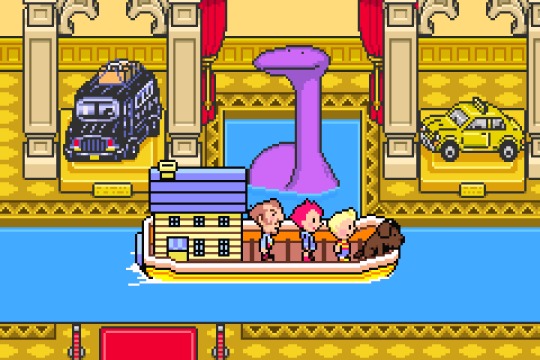
There is no stronger denouement to this ideal than the game's very, very end.
All throughout the game, Lucas has dealt with two of Porky's highest ranking officers. The first one being Fassad, who brings commerce and greed to the people of Tazmily. The other one, someone I haven't really mentioned until now, is only known as "The Masked Man." Mother 3 pits The Masked Man against Lucas as sort of a rival -- he's one of the small handful of humans you meet able to use PSI abilities, and most of them are identical to what Lucas can do.
In the lead up to actually meeting Porky in the flesh for the first time, Lucas finally catches up with his dad, Flint. Lucas hasn't seen his father in years, not since the incident after their mother's funeral that broke up their family. And yet Mother 3 treats his reappearance as strangely casual. There's no big, emotional reunion. Flint and Lucas barely even acknowledge it. Flint is just here now, another NPC milling about with the residents of Tazmily.
On the way to the final showdown, Flint will suddenly ask you to stay behind. He plans to face Porky alone.
And this is probably supposed to raise all kinds of strange questions. Could Flint be the Masked Man? After all, if Lucas has PSI abilities, maybe that's a trait that runs in the family. Maybe he inherited it from Flint, and that's why The Masked Man has all the same abilities.
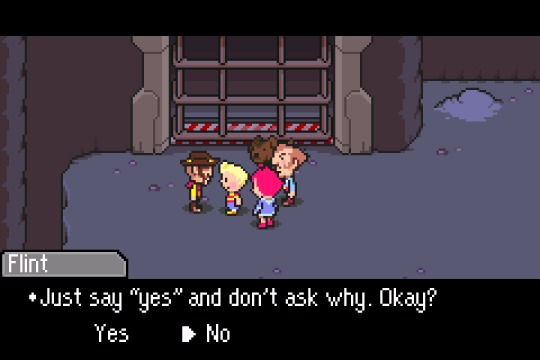
But just one or two rooms later, you find Flint completely laid out. He faced Porky and The Masked Man and came away defeated. It now falls on Lucas and his friends to stop them. Before Lucas leaves, Flint offers one more piece of information for us: The Masked Man, the rival Lucas has faced almost the entire game, is actually his twin brother, Claus.
Once Porky is successfully dealt with, the final battle of Mother 3 comes down to brother versus brother. Claus, the boy who ran from his tragedy, and Lucas, the hero, the boy who became a stronger person by overcoming that tragedy.
That's it. That's everything Mother 3 is trying to say. It doesn't get much clearer than that.
Watching the credits roll, I couldn't help but think back to earlier in the game. There I was, having just arrived in New Pork City, and I was talking to my friends about how it had taken me close to three years to finish Mother 3. I'd only play the game in fits and starts because I didn't really like it, but I was forcing myself through it anyway.
One friend told me, "If you haven't enjoyed the first 25 hours, then it's not like the last five or ten is going to change your mind."
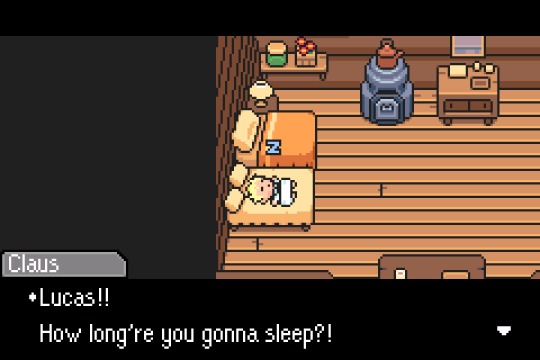
It really cannot be understated how talking to Leder completely rewrote my entire perspective on this game. But then you also have to wonder: how many more people were in the same boat I was and didn't keep going? People who got fed up with feeling like the game was bitter and patronizing and just gave up?
I knew there must have been something special in this game. You have to figure that, given the circumstances (sequel to a 10+ year old RPG, only released in Japan), total lifetime sales figures for Mother 3 are probably under five million copies. Probably under two million, if I'm being honest. That's still in the realm of success, especially for 2006, but Nintendo is also a company that deals in games with 20 million, 40 million, even 60 and 80 million plus sales. Mother 3 is some very small potatoes for them.
Despite such a comparatively modest success, Mother 3's influence feels hard to ignore. From fueling skits on Robot Chicken to Adventure Time and Undertale's whole... everything, Mother 3 (and the wider franchise as a whole) is extremely beloved by many, even if it doesn't do record breaking sales numbers.
And that's before you figure in the whole fan translation angle, too. Everything about Mother 3 screams something that should be niche, and yet it's downright prolific.
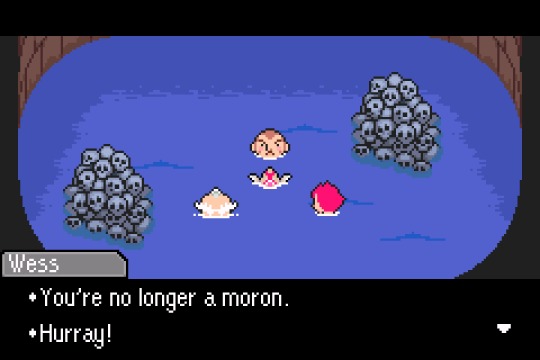
It demanded more respect than giving up before seeing the credits roll. If I had quit upon reaching New Pork City, I would have missed this game's whole redemption arc.
I suppose, then, that just makes this the chronicle of a long, difficult, emotional journey. One I originally felt like I needed to do more than I actually wanted to. That in itself is just another one of those many things adults just have to deal with, right? That's in keeping with the themes of the game.
And, ultimately, there is light at the end of this tunnel. I guess it's not really about charging forward with courage, it's more that as long as you hold on to yourself, everything will be okay. Everyone has their tragedies. But closing yourself off from tragedy or running away from it isn't going to fix you. Your love is what will save you.
The love you share with family. The love you share with friends. The love you share with the world.
Love meant Flint never gave up trying to save Claus, even as that same boy tried to kill him.
Love led Kumatora, Duster and Boney to stay with Lucas no matter how strange or frightening things became. Together, they faced deadly mutants, the darkest hallucinations, and even had to contend with the possibility that all human life on their planet might cease to exist.
Love was Lucas never abandoning the people of Tazmily, even as they shunned him.
Love will provide you with a strength beyond anything else in this universe. No matter how much adult life beats you down, love will always be the single greatest and most simple thing we all have. Rich or poor, old or young, love is the power that binds us all. It deserves to be cultivated, protected, and celebrated. Love heals all. Without it, we cease to be human. And believing in love is what takes the most courage.
But only through love can we find the way forward.
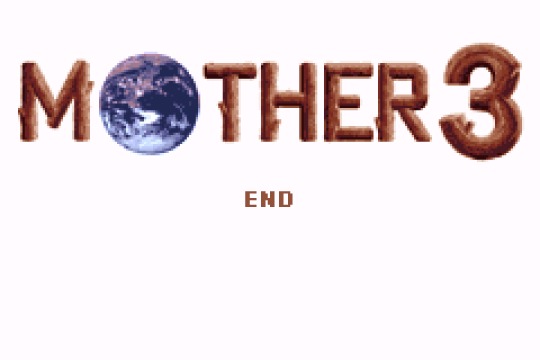
34 notes
·
View notes
Text
the Big TMA Furry List
this list with commentary/choice rationale below the cut :] i wrote a lot of thoughts down do please check it out.
jon: common raven
martin: tan jumping spider
sasha: southern flannel moth
not!sasha: red postman
tim: jackson's chameleon
melanie: eastern copperhead
georgie: triceratops horridus
basira: domestic cat (calico shorthair)
daisy: domestic dog (german shepherd)
elias: barn owl. jonah: eurasian eagle owl.
gerry: domestic dog (black doberman)
annabelle: white-booted racket-tail
jane: cabbage white
michael: spiny softshell turtle
helen: common hermit crab
oliver: black vulture
peter: risso's dolphin
mike: caelestiventus hanseni
jude: black kite
agnes: ???
nikola: stealing major's carousel horse
jared: american dog tick
breekon&hope: Hog and/or Bear. you get no more information
dekker: mouflon
gertrude: great tit
leitner: domestic cat (persian)
manuela: gray long-eared bat
rayner: olm
salesa: sea otter
simon: dodo
elaboration below !
jon: common raven
this was a choice i made before i even finished listening to the podcast back in 2020. jon's 1000% a bird to me, and the curious nature of corvids works well here. plus, i think a bird so universally ominous as a raven works perfectly as a horror protag :P i used to draw raven!jon with a couple troodon traits, mostly just cus it was fun, but i wanted to make my designs more grounded for this iteration. made them plantigrade, didn't get silly with body styles like i have with mp100 designs.
martin: tan jumping spider
if you've been here for a while you'll know that my furry martin has gone through about two million iterations. he started off as a european pine marten, to bold jumping spider, to chinese pangolin, to nine-banded armadillo, finally to nurse shark.
out of all of these the spider and the shark are my favorites. i wanted to go back to the jumping spider though- the design is really fun and i wasn't able to get the expressions right, but i'm more confident in my skills now and i'm having fun with the design. i may revisit nurse shark at some point. i switched from bold to tan jumper- i originally chose bold just cus they're my favorite jumper, but their stark black/white and iridescent aqua coloration just doens't work for martin. so, the tan jumper!
sasha: southern flannel moth
another old choice. species chosen because of a friend's fic, pharos by right (another i'm planning to reread now that i'm dipping my toes back into tma..)! southern flannel moths are poofy and orange, and their caterpillars are those super painful teddybear ones. i really like the design.
not!sasha: red postman
wanted to have her be another lepidopteran, and with all the many examples of mimicry among the group i thought red postman was a fun choice. doesn't look anything like a southern flannel moth, but that's sort of the point.
tim: jackson's chameleon
yet another choice from the oldtimes- most of the main characters are, i've mostly switched around the more secondary chars. first suggested, i believe, by @/ofdreamsanddoodles. i think there's something very fun about chameleons being basically a living mood ring & tim's Descent s1-3 showing physcially not just through the worm scars but through like, constant stress coloration during s3.
melanie: eastern copperhead
one of my favorite choices. i have a young copperhead specimen named after her. this one is quite vibes-based, but i do really like the copperhead as a viper that is not deadly. and i'm always a sucker for the "animal perceived as scary and violent that in actuality only strikes when under extreme stress" thing in furry assignments.
georgie: triceratops horridus
another favorite choice. visually, i really like how this works out, and trikes as a social and protective animal works well. she's literally got a shield on her face. horridus was chosen because i like the shape of the head and horns better than prorsus.
basira: domestic cat (calico shorthair)
got a little cat/dog thing going on for dasira. i like the inversion of the usual cat/dog dynamic with their unhealthy devotion instead, and visually it just works very well for them both.
daisy: domestic dog (german shepherd)
yeah i know this one's an exceedingly obvious choice.
elias: barn owl. jonah: eurasian eagle owl.
it's the institute logo! it's him! barn owl for elias specifically because of its very sleek look, designing him went fantastically. also, i can make the eagle owl's face disk work as a mimicry of ben meredith's muttonchops, which i think is a fun design bit to give to magnus.
gerry: domestic dog (black doberman)
certified gerryguy @/gerrydelano's choice. to quote a discord message from 3 years ago (sorry ron): "i feel like.........my INSTINCT is some kind of canine because like. the whole symbolism thing about being either an obedient or rabid dog. something something muzzled all your life. being a dangerous figure if people only see the silhouette but you just want scritches and nobody'll get close enough to you." black dog symbolism + breed which has ears cropped and tail docked, unecessarily molded for a Purpose which the dog has no say in
annabelle: white-booted racket-tail
sort of my original choice- she used to be part white-booted racket-tail, part anna's hummingbird. kept with the racket-tail cus it's fun and very cute. i've had a couple people express surprise that she wasn't a spider, but i think that's way too obvious. hummingbirds, though- they steal the webs of spiders to use as material to make their nests, but can sometimes become trapped in the webs and eaten by the spiders themselves. which is probably the metaphor-via-fursona-assignment i'm most proud of in this whole list
jane: cabbage white
the cabbage white is a butterfly whose caterpillars are routinely parasitized by the parasitoid wasp the white butterfly parasite. in case you're not familiar, parasitoid wasps lay their eggs on (usually) caterpillars, which hatch on the still-living caterpillar, devouring it from the inside before eventually emerging from the consumed husk of the host. also, i really liked the image of parasitoid wasp larvae emerging from an adult butterfly, rather than a caterpillar.
michael: spiny softshell turtle
for michael and helen, i wanted to choose animals which were, in some way, their own home. turtle is an obvious choice- and spiny softshells are a favorite of mine, and sufficiently strange-looking.
helen: common hermit crab
see previous entry. also please google "hermit crab without shell"
oliver: black vulture
bit of an obvious choice, but i adore vultures so i had to. black vulture chosen because i think the monochrome color scheme + straighter face work better than a turkey vulture for him
peter: risso's dolphin
i really like the idea of a cetacean for peter and the lukases as a whole, a famously social animal for the seemingly contradictory nature of this lonely-but-huge family, plus with so many cetaceans being endangered getting that lonely angle (risso's specifically are not, though, as peter is lonely through his own choice, not by circumstance).
mike: caelestiventus hanseni
it's a dimorphodont. he feels like a pterosaur to me, and i like the idea of a vast avatar as a usually short-flying arboreal species, for the unnaturality/contrast of it.
jude: black kite
black kites are one of the species of kites known to intentionally spread fires by picking up burning sticks to flush out prey.
agnes: ???
the only one i'm still undecided on. will update.
nikola: stealing major's carousel horse
i can't top that
jared: american dog tick
great choice from @/magnusarchivememes. Takes Your Blood And Gets So Big
breekon&hope: Hog and/or Bear. you get no more information
vaguely russian animals that are large and imposing but remain somewhat generic. which is the hog and which is the bear is not consistent.
dekker: mouflon
dekker has very much mammal vibes to me. the mouflon is a neat species of wild sheep. i think the noble, imposing but kind image of the ram works well for dekker as that sort of true-good hero figure, and mouflons in particular are very nice looking with good shapes. the statement giver in distant cousin describes dekker as "though he was slightly shorter than I was, it seemed like he towered over me." which i think this sheep works well with.
gertrude: great tit
i wanted all the main eye avatars as birds, just like how i give them all glasses. just a fun little treat for me. great tit was chosen for gertrude as a kind of classic british bird, and as tits in general are VERY fiesty despite their round and adorable appearance. i really like this image of a great tit posing with a dead mouse like it's a hunter with a trophy deer. the cheek markings also work really well to bring to mind the image of old person jowls.
leitner: domestic cat (persian)
vibes. also i like the idea of him as a spoiled domestic animal. if i remember correctly, this was also @/ofdreamsanddoodles' suggestion
manuela: gray long-eared bat
she's a bat. what's to say. WELL actually okay there's the perception of bats as blind but actually having quite good vision which i think meshes in a fun way with the dark, and the way manuela does her sciency stuff.
rayner: olm
i mean, yeah
salesa: sea otter
largely design-oriented, suitably scruffy. ocean animal with strong social bonds, it was a slam dunk soon as i thought of it.
simon: dodo
how couldn't i, come on.
103 notes
·
View notes
Text
taash podcast notes that i made while listening (spoilers under the cut)
she looks so fucking gorgeous in the thumbnail photo, her big green eyes and her ear cuff oh my god i'm in love i want to kiss her cheek mole
"art is beautiful, she and this place are not" first of all kill yourself
my anger issues wife yelling at nobles, muireann's soulmate fr fr
she's so funny what the hell "i was busy" MA'AM
her speaking qunlat hypnotized me i'll literally do anything she wants
"you ever seen a man just pop like that" "yep" TAASH ASDJHFGBAKDJHG
okay baddie queen getting the orlesian noble killed on purpose???
i hope we get to murder declan violently in the game
EXTREMELY interesting that she's plundering qunari sacred grounds and that the qunari soldiers called her a traitor, to me this reads that she's not part of the qun and the soldiers view her as a traitor to her race, but it's also possible that she's a recent defect
taash being escorted into a prison cell in chains and saying "yeah, yeah" my beloved
taash and nadia knowing each other is VERY interesting, taash having been in jail in dairsmuid is even more so
i LOVE that she's all action. i love a don't talk, just do character and i've written muireann to be the same so i'm looking forward to situations where their thoughts are just in synch without having to discuss it first
hurling a spear from an insane distance and hitting the dragon, stop flirting and fuck me already
"i think it's a qunari general a uh... kithshok!" okay she's definitely not from the qun if she had to take a second to remember the word, paired with her shamelessly pillaging a qunari sacred site it's definitely giving vashoth
"(scoffs) right. the qun" okay yeah (tal)vashoth taash confirmed
taash being so good at identifying dragons is so fun for me, the combined power of her, bellara, and muireann's nerdiness is going to be insane
"hate their politics, love their guns" taash same!! i'm so glad we can hate the qun together i was lowkey worried she'd be a sympathizer when i saw those curtains in her room
it once again being mentioned that taash doesn't like corpses hmmmm i think that's definitely relevant to her storyline
taash doing action one liners i love her so much, i want to put her and wyll ravengard in a room together
JUMPING ON THE DRAGON????? hot + muireann would do the same thing
24 notes
·
View notes
Note
you might have already talked abt this but I’m interested if you have any thoughts on the similarities & differences in Casey & Valentino’s early childhoods and families……I don’t know much abt Casey’s upbringing & the little I know about Valentino’s all makes me go “huh ok I kinda get it now” lol. Idk like I found out Jorge’s whole deal w his dad and I was like “OH OK you make perfect sense to me now” but I’m not there yet w the other two, yk?
so okay,, I do have an ask from forever back about marc and valentino's childhoods that I got extremely stuck at answering, and also an ask about jorge's father that I haven't even touched because like. sometimes you just do not feel up for that lol. and well it's just an area where I do generally try and be quite careful in how I discuss it... BUT this is casey stoner hot take round™ so I will give a reasonably succinct answer to this and not overthink it too much. basically: yeah, I do have thoughts, because casey's childhood does undeniably do a lot of the work in the 'oh okay that makes sense now' department. a lot of his career narrative, his struggles, his disillusionment with the sport... and yes, the way the valentino rivalry unfolded - a lot of it can be traced back quite a long way, to grievances he's been carrying around with him for years and years. I talked in this post about that podcast interview casey did this year, which included... well, a bit of a reckoning. talking as openly as he ever has about how being a rider wasn't ever really his dream - it's something that was decided for him. and that's our starting point... casey's eternally ambivalent relationship with being a rider, one that feels so violently different from valentino's
the big, big contrast between casey and valentino's respective journeys is pretty simple to sum up: it's the joy. valentino was having fun. casey wasn't. now, look - valentino as a child very obviously did not have perfect autonomy in making the choice to be a rider. it's always going to be more complicated than that; his father did obviously push him in that direction. but at the end of the day, it's not too controversial to say that valentino always enjoyed riding and always had fun racing. it's a joy he carried with him on his way to becoming a rider, one that remained a part of his competitive dna throughout his professional career. it's a joy that kept him racing for as long as he did. a childlike joy, in a way - valentino's lack of 'adult' seriousness, how it's been remarked upon that this brutal sport has never quite managed to wear him down. his peter pan persona, how he's the boy who won't ever grow up. and, y'know... valentino had the chance to actually be a kid. he got to have something vaguely resembling a proper childhood. makes sense, right - if you want to be a kid forever, it helps to have been one in the first place
there's a quote of his from 2009 I posted recently:

which, in the context of that interview - this question refers back to an earlier exchange about how casey wasn't a 'romantic' rider (still think that's an objectively pretty funny thing to say about your rival but that's neither here nor there). and, well, valentino's correct! sports has become considerably more professionalised over time. children are less and less likely to be able to afford any sort of life outside of it. which isn't just about reducing passion, right - it's also about not really giving these kids the chance to properly grow up, to become more rounded human beings who don't have to be the perfect little athlete 100% of the time. it's also a correct diagnosis of casey specifically, who certainly could never afford to see racing as a game. I'd recommend reading this autobiography excerpt, where casey tells you exactly that: racing wasn't about having fun for casey. he'd moved to the uk with his parents at fourteen years of age, at which point he essentially became his family's sole provider. his family depended on him not failing - and every opportunity threatened to be his last, his racing future and financial situation always desperately precarious. he was constantly fearful all of his family's sacrifices might have been for nothing. it's immense pressure to put any teenager under, regardless of how much you want to convince them that it's their dream rather than your own. if casey wasn't already an overly self-critical perfectionist before those years, he certainly was by the time he made it to motogp. he couldn't afford to be anything less than perfect. remember: the shape his anxiety took was by making him curl up in his motorhome, terrified of letting everyone down. wonder where that came from
is it any surprise, then, that while valentino feels like kids today take racing too seriously, casey thinks they don't take it seriously enough?
The system has changed: when you put too much pressure on a 20-year-old, he can react by closing up and becoming serious and sad. // Nowadays I see too many kids coming through behaving too relaxed, and too happy with what they have achieved already. I don’t want them to be miserable but they have to understand what’s at stake.
doesn't this make you want to scream. a little
and, look, there are similarities between valentino and casey in ways that will be true of many child prodigy athletes. valentino has spoken about how his father would not do anything with him that didn't involve motorcycle racing, casey likewise has more recently in that podcast said he doesn't think he was allowed to pursue any other interest. we can talk plenty about how the parents of athletes like to use their children to fulfil their own dreams - how their child's athletic performance seems to become the only aspect of their child they have any interest in. how so much of that parental relationship becomes distorted by the ceaseless quest to achieve results. it's there in both of their stories... and obviously they are hardly unique in that respect. there's perhaps a little bit of a divide - to what extent kids are aware of this dynamic and are uncomfortable with it, especially publicly. both casey and valentino are united in being somewhat openly critical of their parents without being completely estranged from them. casey got his parents to move back to australia when he was arguing with his father too frequently as a young rider; valentino has seemingly kept his father at a bit of a distance for years. they've never cut themselves off entirely - but there's a certain undeniable wariness there. a lack of conviction that their parents acted as parents should that they've been willing to hint at publicly, here and there
Our communication is mostly about motorbikes. He wasn't a good father, I mean... When I was with him, playing always meant riding motorbikes for him. // To be honest, I don’t know if I was allowed to have any other attraction to be honest. I think it was, you know, you’re going to be a bike rider from when I was a very very young age - and I’m not the only one to think that.
still, it does come back to the joy of it all. casey justifies his belief that racing isn't fun by talking about how he'd always known how high the stakes were... whereas for valentino, fun is an integral part of the experience. it's what he's there for. and beyond the racing itself, valentino always found his life as a rider considerably more joyous than casey did. which leads us to the other difference between the pair of them: casey's loneliness. valentino has spoken frequently about the importance of his childhood friend group, about having them travel with him and ground him and be there with him throughout - people who knew him before he became the valentino rossi, people he feels that he can fully rely on. he grew up as part of a community and has a strong sense of identification with not just his country but also his town... he's got deep ties to his place of origin and the people who live there, built up over a lot of time, and he draws a lot of strength from that. by contrast, casey grew up moving around a fair bit, unhappy at school and the victim of bullying - his only real friends, he says, were from the dirt track, since they were the only people he 'had anything in common with'. even those friendships don't feel particularly substantial, especially given how often he frames his childhood racing experiences around the hostility of his competitors (and especially their parents) in response to his peerless talent. his parents eventually home schooled him, inevitably further isolating him. then, as a teenager, he moved to the uk where he knew nobody, before moving to spain where he didn't even speak the language. he continued to have a strong sense of connection to australia, fuelled at least in part by homesickness - but it's also a connection to a country he hadn't lived in since age fourteen, a sense of belonging that's fundamentally less stable, less comforting. one that exists primarily in contrasting himself to all the europeans he surrounds with, as a way of making sense of his feelings of cultural alienation - which in truth are sometimes just plain alienation. the paddock cannot function as a home for casey either, and he is unwilling or unable to form substantial connections in that environment. in 2009, ten odd years after moving away from australia, he said his only friend in the paddock was his wife
and yes, it plays into that rivalry - inevitably so. casey and valentino are both somewhat alien to each other, fundamentally unknowable... and it does come back to how at odds they were in their approaches, in how they motivated themselves. casey finds the europeans and their flamboyant celebrations baffling. valentino cannot relate to casey's lack of romantic affection for the sport. casey is there to do a job. valentino is there to put on a show. casey does not think racing should be about having fun. valentino believe the fun is non-negotiable. casey loves almost nothing about being a rider, whereas valentino loves almost all of it
another thing. when I was writing this post about the similarities between casey and valentino, one aspect I talked about was how they can both be.... uh. suspicious characters, shall we say. paranoid, some might call them. conspiratorial, even. now, again, to some extent they do share this with a lot of other athletes, it's kind of part of the game. but, y'know, they do take it quite far - and there's quite a pleasing parallel between the pair of them where they've both come up with a conspiracy theory about one of valentino's lost titles. which leads us to quite a nice distinction between these two theories. not to brag, but I kinda feel I nailed one of the most important elements of their dynamic:

now, look. I deliberately did not do this,, but obviously if you really wanted to, you can do some pop psychology on valentino's approach to interpersonal attachment and relate that back to his relationship with his parents. I am not interested in doing that for various reasons, most of which the cia would not get out of me, but I'm aware it's an approach you can take. in any case, I do still think you can make quite a straightforward case for this distinction: one of them believes the world is fundamentally out to get them, one of them doesn't. one of them is waiting for the system to fuck them over, the other is wary of individuals who have gotten a little too close. both of them at times are exceedingly ready to read malice into the words and actions of those around them - and both of them can react rather dramatically to such a provocation. the shape their suspicion takes is a little bit different and a little bit the same... but it's central to understanding both of them, in a way that does set them apart from their competitors. they're the two aliens who are the most likely to read an agenda into anything and everything. they're the ones who are most likely to take note of slights, to accumulate grievances. the most likely to not forget when they have been wronged - and to take great pleasure in getting back at whoever has done them ill
in the end, it all comes back to just what an excellent foil for casey you have in valentino. in all the ways casey defines himself against valentino, in all the ways valentino challenges casey, in all the ways casey's issues with the sport are inextricably interwoven with the character of valentino rossi. casey hates so much of the sport in ways that are tied so closely to valentino; he hates a system that invariably would like nothing more than to see valentino succeed. but valentino also represents what casey cannot be - not just an entertainer, but someone completely at ease with their life as a rider. someone who finds joy in that life, who did not step away from it until he absolutely had to. valentino is there long before casey arrives and he is there long after casey leaves. valentino is an idol, an enemy, a mystery. more so than any other rider, valentino embodies an emotion that casey believed he simply could not afford to feel. valentino is the sport's joy - and casey was never there to have fun
#lads you've really come through for me on the casey ask front#feel free to keep them coming since some just NEED a more considered response than i am currently able to provide#still ever so slightly irritable that the only bit of that casey podcast interview that got any purchase was the two mins about sepang 2015#free yourselves from the crash dot net editor in your own minds#//#brr brr#batsplat responds#heretic tag#i've zeroed in on the kinda depressing asks but trust i've been ruminating on the others too#kinda the sister rivalry to agassi/sampras and henin/clijsters to me in that the text defo slaps but the THEMES make me insane
22 notes
·
View notes
Note
Idk if people saw it so I'm just warning you all.
There's some sort of "alpha male" (lol) podcaster, with a lot of followers who thinks he's a God named Andrew T*te that called Louis a homophobic slur in one of his videos, because Louis happened to appear on the profile picture of a random girl who tweeted something about Kamala Harris. Which then got his worshippers to attack a random 16 year old girl on Twitter with extremely hateful, misogynistic and homophobic comments.
Idk if you saw it but I'm hoping people don't give it too many views. It's violent and already going downhill. Louis might end up finding out about it. Twitter is ruined forever
That idiot is still around? I thought he went to jail. Sigh. He really is trash and his followers are braindead.
I hadn't seen any of this, but hopefully that girl is okay and I hope Louis actually stays out of it. There's no point in engaging with people like that.
Twitter was ruined a long time ago. But I get your point.
18 notes
·
View notes
Note
Hello ☺️
I was listening to The Age of Napoleon podcast and the host puts forward the idea that when Murat was inexplicably unwell in Spain of 1808, it was more of a mental breakdown because Napoleon had not been pleased with Murat trying to request for the position of King of Spain.
I know the cause and the illness itself was never really confined and I've heard the King of Spain request a number of times in contemporary writings. If this is not true what do you think caused his illness at that time?
Hello! This is an interesting subject, and I tend to disagree with the standard narrative that Murat’s illness in Spain was due to him not getting the Spanish throne. First, I think the idea that he was so bent on becoming King of Spain is really hyperinflated. That he wanted *a* throne for himself and Caroline, I don’t doubt; I just don’t agree that he was particularly enthusiastic about being King of Spain; perhaps during his early days in the country when he was still fairly upbeat about the state of things, but definitely not after the Dos Mayo uprising and the ensuing rapid deterioration of the situation in the country. The May 2 uprising came as a brutal shock for Murat. If you read his correspondence leading up to it—and I included several of the key letters around this period in my book—in general, he was very (naively) optimistic about the state of things in Spain, the reception he received upon entering the country, and what he perceived as pro-Napoleon sentiments from the populace. He was frustrated by Napoleon’s lack of clear directions and the complexity of the increasingly fraught political situation but overall was still convinced—even after one of his aides-de-camp was stabbed at a bullfight in late April—that nothing was going to happen and the Spanish people would accept whatever decision Napoleon made about the Spanish crown. When the capital exploded in violence on May 2, judging from the tone of his letter to Napoleon written that day he was quite shaken by it, although he did his best to ensure Napoleon that it was nothing but a small minority of troublemakers and that the vast majority of the people of Spain were still pro-French. Marbot writes that Murat “quite misjudged the Castilian character” and “imagined that they would be frightened by the suppression of the revolt at Madrid, and would make a complete submission.” He ended up being wrong again, and honestly I think he just wasn’t well equipped to handle the situation. He didn’t deal well with these types of deteriorating situations well at all (see also the Russian retreat after Napoleon left him in charge), and the stress inevitably took an awful toll on him.
All of the above might seem like I’m going off topic from your question, but I think it’s relevant in the context of Murat’s ensuing illness because Spain is really the first instance where his health is dramatically affected at a point of intense stress, strain, and overwork. If his alleged disappointment over not getting the Spanish throne factored into it at all, I think it was only a small part of it. There’s one key quote I came across years ago in a memoir and I’ve been trying to track it down again and am so far failing, it may have been from Roederer or someone else who accompanied Joseph, but it was an observation that Murat seemed greatly relieved to put Spain behind him. The more I think about it, I can’t help but conclude that Murat’s disappointment might’ve had more to do with his perception of being slighted/unappreciated/cast aside by Napoleon, than it did with the throne of Spain per se; he and Joseph also disliked each other, and to see Joseph chosen over him probably was an extremely bitter pill to swallow. Murat will have similar bouts of bad health in Naples during periods of heightened tension/perceived insults and disrespect from Napoleon, especially in 1811.
When Murat fell ill in Spain, his health collapsed so quickly and violently that it was speculated that he had been poisoned. He complained of severe stomach pains and was vomiting bile. Historian/Murat biographer Vincent Haegele writes that “The effects of this disease manifest themselves physically on a body largely exhausted by stress, shortened nights, and perhaps immense resentment for the Emperor. Murat exhausted himself by working during the day and could no longer sleep at night, as noted by La Forest, who was serving as French ambassador to Spain at the time. La Forest described Murat having “restless nights” and, in Haegele’s words, “a nervous tension that was less and less controlled,” exacerbated further by news of growing uprisings throughout Spain and the assassinations of various Spanish officials, situations which forced an already exhausted and unhealthy Murat to have to keep working even harder. He relapsed in early June, and La Forest wrote on 7 June 1808 that Murat “spent a bad night, given over to melancholy ideas” and that “General Belliard asked me not to go and see him, confiding in me that H.I.H. needed solitude and was suffering from nervous affection.”
So tldr; I think Murat’s illness was mostly the combination of too much stress and overwork, that not getting the Spanish throne was a smaller part of it that has been largely overblown.
37 notes
·
View notes
Note
i think the reaction to characters being unfair to jon is a good example of how fandom often lacks nuance and has a lot of black and white thinking. while it absolutely is ridiculous and unfair to say characters are evil and terrible people for being mean to jon, it’s just as absurd to say how they treated him was justified and there was nothing wrong with it. i think people have split into two extremes on this issue, which misses the point that the entire podcast is about how people react and interact and change when dealing with fear and extreme situations like this, not about who’s right and who’s wrong. jon was consistently treated with less empathy than the other characters treated each other, and held to a different standard. the other archives staff are much more willing to give each other the benefit of the doubt, and while they’ll criticize each other at the end of the day there is much more tolerance for each other’s issues than there is for jon’s. that is undeniable. they see each other as humans who make mistakes, and jon as a rabid monster who cannot be trusted. from their perspective, jon is someone standoffish and unfriendly who always pushes too far and asks too much and has growing powers that directly come from the entities responsible for their torment. he is both their superior in terms of his job, and he is essentially the favored child of their jailer. basically like elias, but significantly more present and vulnerable and less of a distant untouchable threat. he has enough power over them (or at least association with those who have power over them) to make them resent him, but not enough to stop the torment or prevent them from lashing out. when you and everyone else you know are humans who are trapped together and suffering, and your boss is locked away feeding on fear and turning into a dangerous monster like the ones who keep hurting you, you’re probably not going to be feeling particularly empathetic towards him. you’re not going to stop and think about how he’s a victim in all this too, because you’re not in a stable enough space to do that and you don’t know his perspective on any of this. that makes sense. it doesn’t excuse the way they treat him like a violent animal, but it does explain why they would have that us versus them mentality. also, all the info on the other archive staff’s emotional state from season 3 and onward, the stuff that explains why they acted the way they did, all of that is from occasional lines and overheard interactions. small pieces. jon is the main character, and we hear the details of his experiences and struggles and trauma and breakdowns and suffering. he is the protagonist and his is the perspective the listener lives in. therefore, he is going to be much easier to be sympathetic towards. if melanie was the protagonist, or even another avatar like annabelle or mike crew, people would be much more understanding of them, because it is easier to be sympathetic when you know every reason why a character acts the way they do. if we listened to melanie for hundreds of hours, her lashing out and getting violent towards characters that didn’t deserve it would be much more understandable. we hear what jon is going through, so we know his life is hell and he is a genuinely good person faced with impossible choices and absolutely terrible situations out of his control. the other characters do not have that perspective and understanding. i just think it’s possible to acknowledge that some characters did treat jon terribly, he didn’t deserve it, and it doesn’t make them irredeemable monsters.
.
34 notes
·
View notes
Text
I don't know what made me think of this, but I was imagining what the (student) cast of Resident Lover would get voted "most likely to". I think those things are called superlatives or something? idk. anyway, so far my brain has supplied:
Angie: Most likely to start a true crime podcast (or be heavily featured/discussed in a true crime podcast) Bela: Most likely to succeed/Most likely to achieve world domination (the photo of her is, like, either a: her driver's license photo, b: a blurry shot of her from a distance, or c: a photo that she very clearly didn't realize was being taken. because she's too busy to stop for 3 seconds to let the yearbook team get a photo) Cassandra: Most likely to become famous/Most likely to die single surrounded by pussy (oop sorry not sorry) Daniela: Most likely to become an Olympian (tied with Jasmin, probs) Mia: Most likely to disappear under extremely mysterious, questionable, and violent circumstances (only to reappear on your social media's suggested friends list 5-10 years later, acting as if nothing ever happened)
#resident lover#i shan't speak for the dev npcs#caldwell (when they were a student) would be most likely to get a charity named after them oop#as faculty it would be most likely to become a obscure local legend or some shit like that idk#my highschool didn't really do much stuff like this#i'm just imagining it for the giggles#i think mine (as a real person) would have been most likely to Actually Have Been A Ghost This Whole Time
27 notes
·
View notes
Text
who were the merovingians?
I want to stress that I'm not a historian! I just have a strong interest in this period and enjoy learning what I can about it. Most of my knowledge comes from reading Gregory of Tours, as well as Ian Wood's Merovingian Kingdoms and Edward James' The Franks. I also quite enjoy Nelson Bennett's podcast The Merovingians, which gives a great overview of the primary sources and some of the ways historians have interpreted them.
My access to recent academic literature is limited, but if you personally have any papers or lectures to recommend I would love to know about them!
The Merovingians were a dynasty of Frankish kings that reigned from the 5th-8th century, in the region encompassing modern France/Germany/Belgium.
They are most well known for being violent and power-hungry: brothers plotting against brothers, kings plundering their neighbours, and queens sabotaging their rivals.
While this aspect of the Merovingians gets the most attention, there is more to learn about these people than that. There were also some very interesting and influential women living at this time, including not one, but TWO very powerful queens.
While there are few surviving manuscripts and artifacts from this time, the few we do still have access to are very important. Gregory of Tours' History of the Franks (its actually called the Ten Books of Histories but no one calls it that) is the main primary source available to us. It documents the events from the reign of Clovis' father Childeric to the reign of Clovis' grandsons into the late sixth century. While some of Gregory's stories are embellished and contain some inaccuracies, his writings are extremely valuable not just for the history they document, but for giving us other information about what life was like during this time.
My objective for this blog is to share my interest in this time period and document what I learn about. Hopefully I will get some more people interested + meet others who are as transfixed by the merovingians as I am!
7 notes
·
View notes
Text
Thank you to @mclennonlgbt and @getbackmountain for tagging me!
last song: It was unironically "Wonderful Christmas Time" on the Beatles Channel at Sirius lmao
last book: Armageddon: What the Bible Really Says about the End by Bart D. Ehrman.
With this one I was looking for something heavier after reading so many Beatle books. I went to a Catholic university for my bachelor's degree and the course requirements included Biblical study ministered by the local religious order. I come from a Protestant background but it was very different from the typical evangelical upbringing that a lot of Americans get saddled with. Truthfully my parents always seemed embarrassed by church services and we never go because the actual physical location is over an hour away by car. I don't go anymore because it's such a pain. I have my share of religious trauma but it's very different from what other Americans typically go through so I can't really connect to anyone about it.
Reading Ehrman's book was a very interesting and even healing experience for me. No one has ever tried to intimidate me with apocalyptic fears face to face but I have noticed and been disgusted by how they dominate American politics. When I attended theology seminars at university the priests always emphasized that Revelations is a metaphorical record of Rome's oppression of Christians and that the evangelical interpretation presented in Left Behind is a byproduct of watching too many Hollywood movies. Ehrman takes this even further and actually does the legwork of analyzing Revelations, pointing out that it directly contradicts Jesus' original message in the first place, and chronicles the history of the book itself. Revelations is surprisingly controversial and is only really present as a result of the Protestant Reformation because Protestants were attracted to how flashy and materialistic it is.
Meanwhile the Catholic church rejected it for centuries because they (correctly) believed that it promoted violence, war, greed, and materialism which made it completely unsuited to be included in the Bible. Ehrman also hosts a podcast on Youtube where he points out multiple times that Revelation completely contradicts what Jesus taught and how he behaved because Jesus was simply not a violent person and railed against it multiple times when the disciples tried to bait him into leading violent revolution against the Roman Empire.
Ehrman himself comes from the evangelical tradition which he has since distanced himself from (he may actually be just flat out agnostic now) but he makes several interesting points about people who believe in the Left Behind Hollywood narrative of Revelation vs people who don't bother thinking about it and just try to get on with the business of being Christians. He pointed out that dogmatic believers in the Hollywood version are extremely passive -- he explicitly uses the word passive -- and that typically they don't exert themselves towards doing the things Jesus wanted people to do like being charitable, working in shelters and helping the homeless, donating food or time or resources, that kind of thing. Whereas the squishy middle types who refuse to be dogmatic and judgmental are much more likely to actually be involved in such charitable works.
I am going to re-read it soon but its a very fascinating book. Definitely rearranged my brain chemistry in the best way, he's clearly an expert in his field and he works hard to lay out what exactly Revelation is and compares it to other eschatological stories written down in the Bible. He also makes interesting contrasts between the Book of John and the Book of Amos which was riveting.
I suppose if you're not into Biblical scholarship it might be a bit dry.
last movie: I haven't watched a movie in months. I guess the last movie I went out to the theater for was Five Nights at Freddy's. It was a good movie though I think the games are dumb.
last tv show: I actually don't watch tv much anymore. I did another Frasier rewatch recently, I'm back into season 2.
I'm primarily a gamer over everything else, I've been playing tons of Baldur's Gate 3 and Stardew Valley.
sweet/spicy/savory: Spicy, savory just means "vinegar" now, and sweet is, yknow. Spicy actually has flavor.
relationship status: Attached! I'm in an internet relationship with my beau across the Atlantic, though we did finally get to meet this year at a convention. I'm going to the UK next year to hang out with them!
last thing i googled: Dragon Age Veilguard criticism lol. Fuck that game and fuck Bioware. Hope they enjoy choking on their death throes.
current obsession: McLennon still but I am also getting into western esoterica and occultism. Not because I really believe in dumb shit like demon summoning or magic but I think that it's a great avenue for personal development. Like most millennials I'm still not a fully formed adult and I'm trying to make my way. Justin Sledge gets touted a lot but that's because he has a great channel. I'll be joining his Patreon in December.
looking forward to: UK visit, finally updating my McLennon longfic (I know its almost been a full year, I'm sorry), writing more for Daredevil fandom and picking that longfic back up again, growing up finally, hanging out more with my friends, breaking back into meatspace.
Tagging: @dovetailjoints, @backbenttulips, @crepesuzette2023 (if they haven't done it already), @erinarigby. If you see this and think "she should have tagged me" then please go ahead and do it while tagging me back, I just don't have a good memory.
4 notes
·
View notes
Text
I don't usually talk a lot about history and stigma around mental illness but after listening to the latest episode of one of the mental health podcasts I like, I just found it so interesting that I want to mention it.
You're getting my breif version but you can find the episode yourself if you're interested and I recommend listening to the podcast (Inside Schizophrenia) if you're interested in learning about schizophrenia —the illness, treatment, and history. Be warned though, this 1 episode in particular has a tw for violence and very disturbing crimes.
Most people are familiar with the stereotype of schizophrenic serial killer or otherwise violent and demented portrails of people with schizophrenia and other mental illness. I've met a lot of people who believe in this stereotype about schizophrenia, and bipolar too. I've been asked if my medication keeps me from killing people. Even someone in the psych ward with me said "damn girl, you hurt people??" when they found out I take antipsychotics.
As the podcast pointed out, in the 1920s, there are sources that talk about people with schizophrenia being mostly harmless, to put it simply. But in the 60s, during all the civil rights stuff, the government started labeling people with schizophrenia and associating it with violence which was never the case previously. The government "diagnosed" a lot of people (a lot of black people) with schizophrenia. Along came a trend of both the government and the news outlets labeling people as an extremely dangerous schizophrenic or violent psychotic person. There was no correlation and no actual symptoms of schizophrenia (hallucinations, delusions, etc) It was simply something that sounded good (or rather, sounded bad. Bad and scary).
The idea is usually that in order to do something so violent and, well, "crazy", you'd have to be mentally ill —when that's really not the case. Criminologists in the past (70s I think) were looking for just that: the crazy people committing murder and assault. But they didn't find it. What they found was that the majority of these crimes were committed either by "regular people" or committed by people with other issues not considered mental illness.
Not every mentally ill person is completely harmless and non-violent, but that goes for the entire population. To use an example from the podcast, most serial killers have been white men, a much bigger percentage than of people with diagnosed mental illness, yet that doesn't make (most) people afraid of white men in general.
Interesting too, is that you have to take into account the fact that the violent murderer could be *lying* to try and get away with their crime. There are offenders including serial killers who gave stories of delusional thought and/or hearing commanding voices who later admitted that they'd actually made it all up. I can't remember the name but if I recall correctly one of them claimed a dog had commanded them to kill but later said that was a lie.
It's just so much easier to believe that the only danger comes from mentally ill people. Because believing *anyone* could be the culprit is much scarier and you can't protect yourself from them as easily as you can protect yourself from the image of a raving, crazy escaped mental patient.
But that belief doesn't actually protect you, and what's worse it comes at the expense of all of the innocent mentally ill people just trying to live.
I wish there was a short and simple way to say this to people.
#mental illness#stigma#schizophrenia#psychosis#inside schizophrenia#schizophrenia awareness#schizoaffective#221bluescarf.txt
22 notes
·
View notes